U.S. Federal Courts
Texas AG Paxton sues Biden administration over LGBTQ protections
“States should be able to choose protection of privacy for their employers- this illegal guidance puts many women and children at risk”

AMARILLO, Tx. – In a 19 page long lawsuit filed Monday in the Northern District of Texas federal court, Texas Republican Attorney General Ken Paxton argued that the state, as an employer, has the “sovereign right” to choose its own workplace policies regarding LGBTQ policies and the U.S. Equal Employment Opportunity Commission, (EEOC) guidance issued this past June amounts to “extreme federal overreach” by the Biden Administration.
“States should be able to choose protection of privacy for their employers over subjective views of gender, and this illegal guidance puts many women and children at risk,” Paxton said in a statement after filing the lawsuit. “If the Biden administration thinks they can force states to comply with their political agenda, my office will fight against their radical attempt at social change.”
He added, “These backdoor attempts to force businesses, including the state of Texas, to align with their beliefs is unacceptable.”
“The filing by Texas is yet another wake-up call that we urgently need to enact federal legislation to codify Bostock, the Supreme Court’s recent decision holding that federal sex discrimination laws protect LGBTQ people,” said Shannon Minter, Legal Director, the National Center for Lesbian Rights in an email to the Blade.
“Texas and other red states are on a mission to radically limit the Court’s holding in Bostock and to strip transgender people, in particular, of essential protections,” Minter added.
The EEOC guidance was issued in response to the U.S. Supreme Court’s landmark 2020 ruling in Bostock v. Clayton County, which said discrimination against gay and transgender workers is a form of unlawful sex bias under Title VII of the Civil Rights Act of 1964.
The EEOC guidance relies on a U.S. Supreme Court ruling from last year in Bostock v. Clayton County. In a 6-3 ruling authored by Justice Neil Gorsuch, the high court’s majority held that Title VII of the Civil Rights Act of 1964 extends employment discrimination protections to cover LGBTQ people.
Paxton’s lawsuit claims the guidance violates Title VII by treating sex and gender identity the same.
“The June 15 guidance explicitly allows sex-specific bathrooms and implicitly allows sex-specific dress codes and pronoun usage policies as a general matter,” the lawsuit states. “But it then ‘tries to work around [those concessions] with a linguistic device’ by conflating ‘sex’ with ‘gender identity.’”
The suit filed Monday is in addition to a separate legal challenge by 20 other Republican-led states this past August. That challenge to the EEOC memo adds in also a separate U.S. Department of Education directive covering the rights of transgender students. Those states, led by Tennessee, moved for a preliminary injunction earlier this month.
Defendants in the lawsuit include the EEOC, commission Chair Charlotte A. Burrows and U.S. Attorney General Merrick Garland.
Transgender Texans have long been a target of Republican state officials, the Texas Tribune reported. In 2017, the state Legislature attempted to pass Senate Bill 6, known as the “bathroom bill,” that would have required transgender people to use bathrooms in public schools, government buildings and public universities based on their gender assigned at birth. However, the bill failed to pass even during a subsequent special session.
The Tribune further noted that lawmakers introduced numerous bills targeting transgender Texans, including legislation that would restrict transgender student athletes’ participation in school sports and prohibit doctors from offering gender-affirming medical care. But neither of those measures made it to Gov. Greg Abbott’s desk.
In all three special sessions he’s called since May, Abbott has made limiting transgender student athletes’ sports participation a priority. No such measure passed during the first two special sessions. This year’s third special session started Monday.
U.S. Federal Courts
Supreme Court: Skeptical of arguments to restrict abortion pill
The justices’ questions showed skepticism toward arguments that concrete harms will result if the medication remains widely available

WASHINGTON – Hearing oral arguments on Tuesday in FDA v. Alliance for Hippocratic Medicine, the U.S. Supreme Court appeared skeptical of arguments to curtail access to the abortion pill mifepristone.
A decision in the case is expected to come in June. The court’s most conservative justices, Samuel Alito and Clarence Thomas, signaled their support for the anti-abortion plaintiffs, who seek to prohibit telemedicine prescriptions and distribution of the pill by mail.
A ruling in their favor could also undermine the ability of the U.S. Food and Drug Administration to exercise its expert judgment on the safety and efficacy of medications without interference by courts — which, by and large, are not qualified to adjudicate these questions.
Such concerns were relayed even by justices like Neil Gorsuch, who was appointed by former President Donald Trump, and who warned on Tuesday that the case might stand as “a prime example of turning what could be a small lawsuit into a nationwide legislative assembly on an F.D.A. rule or any other federal government action.”
Mifepristone was first approved in the year 2000. The drug, taken together with misoprostol, is the most commonly used method of terminating pregnancies in the U.S.
The justices’ questions also showed their skepticism toward plaintiffs’ arguments that concrete harms will result if the medication remains widely available. For instance, Gorsuch and Justice Ketanji Brown Jackson noted healthcare providers are already permitted to opt out of providing care to which they have moral objections.
Even if the Supreme Court rules in favor of the government, preserving access to mifepristone including through telemedicine and mail-order prescriptions, more than a dozen conservative states have banned the drug and implemented near-total abortion bans pursuant to the court’s 2022 decision in Dobbs v. Jackson Women’s Health Organization.
U.S. Federal Courts
Renewed criticism by Alito of Obergefell marriage equality ruling
“Americans who do not hide their traditional religious beliefs about homosexual conduct will be ‘labeled as bigots and treated as such”
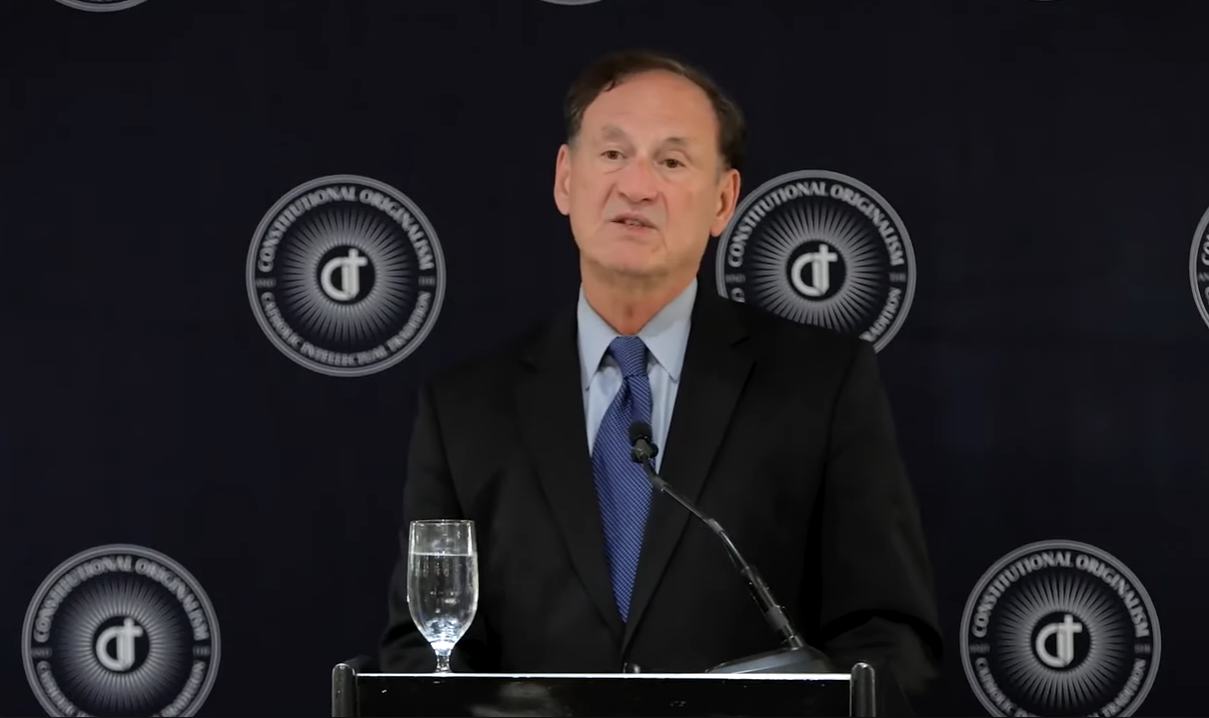
WASHINGTON – Conservative U.S. Supreme Court Justice Samuel Alito on Tuesday renewed his criticism of the landmark 2015 ruling in Obergefell v. Hodges that established the nationwide constitutional right to same-sex marriage.
His remarks came in a 5-page order that was written in connection with the High Court’s decision not to hear Missouri Department of Corrections v. Jean Finney — a dispute over whether a juror’s position that “homosexuality, according to the Bible, is a sin” can be the basis for striking him from an employment discrimination case that was brought by a lesbian.
The conflict, Alito argued, “exemplifies the danger” he foresaw in the Supreme Court’s same-sex marriage ruling, which was decided by a 5-4 majority with Alito among the justices who dissented.
Specifically, Alito raised concern in his statement that “Americans who do not hide their adherence to traditional religious beliefs about homosexual conduct will be ‘labeled as bigots and treated as such’ by the government.’”
“The opinion of the court in [Obergefell] made it clear that the decision should not be used in that way,” the justice wrote, “but I am afraid that this admonition is not being heeded by our society.”
U.S. Federal Courts
Supreme Court to consider abortion pill case
“This administration will continue to stand by FDA’s independent approval and regulation of mifepristone as safe and effective”

WASHINGTON – The U.S. Supreme Court on Wednesday agreed to consider a case challenging access to the most commonly used method of abortion in the United States, a medication called mifepristone.
The justices will weigh in on restrictions imposed by the conservative U.S. Court of Appeals for the Fifth Circuit, which would prohibit patients from receiving the medication by mail, even for those residing in states where abortion remains legal.
They will also consider the lower court’s ruling that mifepristone may only be used to terminate pregnancies up to seven weeks, which underscores the unprecedented nature of this case, the first of its kind to challenge the FDA’s expert judgment on drug products.
It was more than 20 years ago that the agency first concluded mifepristone was safe and effective, determinations that were since reinforced over the years as the drug came into wider usage.
Also on Wednesday the Supreme Court separately and unanimously rejected an appeal from abortion opponents who sought for the justices to revoke the FDA’s approval of mifepristone.
“The Supreme Court has agreed to review the Fifth Circuit’s decision on mifepristone, which threatens to undermine the FDA’s scientific, independent judgment and would reimpose outdated restrictions on access to safe and effective medication abortion,” White House Press Secretary Karine Jean-Pierre said in a statement.
“This administration will continue to stand by FDA’s independent approval and regulation of mifepristone as safe and effective,” she said. “As the Department of Justice continues defending the FDA’s actions before the Supreme Court, President Biden and Vice President Harris remain firmly committed to defending women’s ability to access reproductive care.”
Jean-Pierre added, “We continue to urge Congress to pass a law restoring the protections of Roe v. Wade—the only way to ensure the right to choose for women in every state.”
The press secretary’s statement began by noting how, “Across the country, we’ve seen unprecedented attacks on women’s freedom to make their own health decisions” as “States have imposed extreme and dangerous abortion bans that put the health of women in jeopardy and that threaten to criminalize doctors for providing the health care that their patients need and that they are trained to provide.”
“No woman should be unable to access the health care that she needs. This should not happen in America,” she said, “period.”
Democratic National Committee National Press Secretary Sarafina Chitika released the following statement to the Washington Blade on Wednesday:
“Donald Trump rightfully takes credit for ‘killing’ Roe v. Wade — and now his party of extremists have been working to ban abortion in every state in America. If Trump’s Supreme Court majority decides to strip away access to mifepristone next year, it will be MAGA Republicans’ latest attack on freedom in their war on a woman’s right to make her own health care decisions.
“As anti-abortion extremists put obstacle after obstacle between women and the care they need, President Biden and Vice President Harris are fighting to protect the right to choose. In every election since the overturning of Roe, voters have sent a resounding message: they want more freedom, not less – and come 2024, Republicans will once again face the repercussions of their unrelenting crusade to strip away our rights.”
U.S. Federal Courts
U.S. Supreme Court upholds Washington’s conversion therapy ban
Major scientific & medical groups, LGBTQ & other civil rights organizations support conversion therapy bans for minors
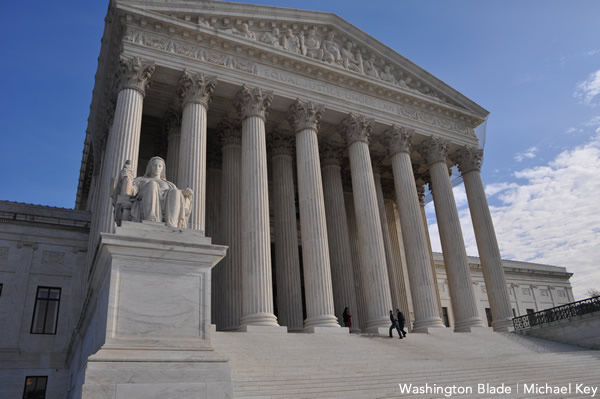
The U.S. Supreme Court on Monday allowed Washington State to continue enforcing its ban on conversion therapy for minors, another blow to the dangerous and discredited practice of endeavoring to change a patient’s sexual orientation or gender identity.
With a 6-3 vote declining to hear a challenge brought by the anti-LGBTQ Alliance Defending Freedom, the Supreme Court allowed the U.S. Court of Appeals for the Ninth Circuit’s decision protecting the law to remain in effect.
Conservative Justices Brett Kavanaugh, Samuel Alito, and Clarence Thomas voted to take up the case, with Thomas writing a five-page dissent in which he argued “licensed counselors cannot voice anything other than the state-approved opinion on minors with gender dysphoria without facing punishment.”
“In recent years, 20 States and the District of Columbia have adopted laws prohibiting or restricting the practice of conversion therapy,” Alito wrote in a brief dissent. “It is beyond dispute that these laws restrict speech, and all restrictions on speech merit careful scrutiny.”
“This is a huge victory, albeit by the narrowest of margins given that three justices would have taken the case,” Shannon Minter, legal director for the National Center for Lesbian Rights (NCLR), told the Blade in a statement reacting to Monday’s decision.
“It is chilling that the dissents focused on transgender youth and appeared to endorse conversion therapy to prevent them from being who they are,” he said, adding, “Now that we have been given this reprieve, we must do everything possible to educate the public about the terrible harms of conversion therapy for all LGBT youth, including those who are transgender.”
NCLR represents one of the litigants in the case, Equal Rights Washington, which was involved in defending the law — which allows providers to discuss conversion therapy with patients younger than 18 or recommend that it be administered by a religious counselor, but prohibits licensed therapists from performing it.
Major scientific and medical groups as well as LGBTQ and other civil rights organizations support conversion therapy bans for minors, which have passed in 22 states and D.C. according to the Movement Advancement Project.
Judge Ronald M. Gould, writing for the three-judge panel of the 9th Circuit, argued in his decision on the case challenging Washington’s ban that, “States do not lose the power to regulate the safety of medical treatments performed under the authority of a state license merely because those treatments are implemented through speech rather than through scalpel.”
Gould noted that Brian Tingley, a family counselor and advocate for conversion therapy who challenged the law, was still able to communicate about conversion therapy, express his personal views on the subject to his patients, practice conversion therapy on adults, and refer minors to counselors not licensed by the state.
“For decades,” wrote Washington state Attorney General Robert W. Ferguson in a brief, “this court has held that states can regulate conduct by licensed professionals, even if the regulations incidentally impact speech.”
“Conversion therapy,” he added, “puts minors at risk of serious, long-lasting harms, including increased risks of suicide and depression.”
“The Supreme Court has allowed a lower court’s ruling on Washington state’s ‘conversion therapy’ ban to stand—a decision that should have been status-quo and not at all controversial,” Cathryn Oakley, senior director of legal policy at the Human Rights Campaign, told the Blade in a statement.
“But given the recent decisions of this Court, today’s ruling is an important victory as we fight to protect the rights and wellbeing of LGBTQ+ youth across the country,” Oakley said. “Thank you to NCLR for fighting so tirelessly everyday to safeguard these hardfought rights.”
U.S. Federal Courts
White House condemns appellate court abortion pill ruling
Vice President Harris & White House Press Secretary Jean-Pierre issued separate statements objecting to the U.S. Court of Appeals ruling
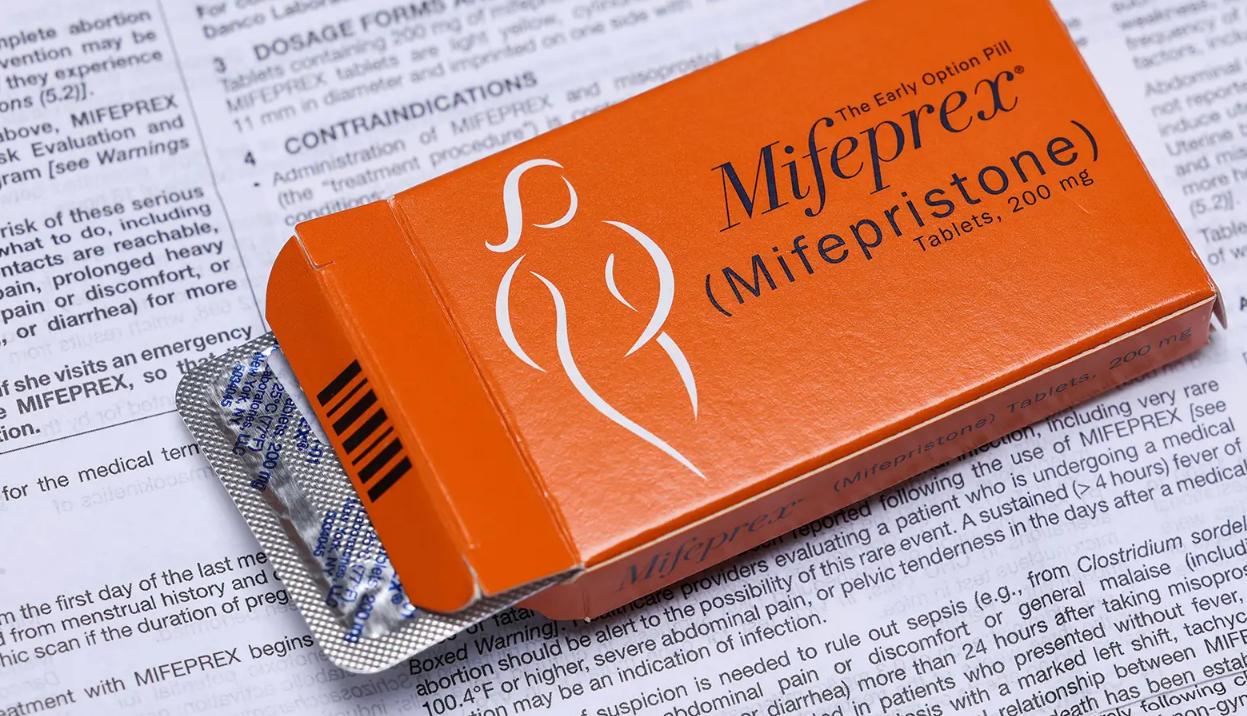
WASHINGTON – Vice President Kamala Harris and White House Press Secretary Karine Jean-Pierre issued separate statements on Wednesday objecting to a ruling by the U.S. Court of Appeals for the Fifth Circuit, which upheld a lower court’s restrictions on access to the abortion pill mifepristone.
Both, however, noted the U.S. Supreme Court’s issuance in April of a stay in the case, Alliance for Hippocratic Medicine v. FDA, which halted the enforcement of any changes to the drug’s availability pending the outcome of the appeals process.
The lawsuit aims to invalidate the U.S. Food and Drug Administration’s 23-year-old approval of mifepristone, a medication that scientific and medical experts overwhelmingly agree has since been proven safe and effective.
Harris and Jean-Pierre stressed that the restrictions handed down by the appellate and district courts constitute medically unnecessary barriers to reproductive healthcare, while the litigation threatens to imperil the FDA’s statutorily ordained right to exercise its expert judgment over drug products in the U.S.
“The President and I remain committed to protecting a woman’s right to make decisions about her own health care,” the Vice-President said.
The press secretary echoed those comments. “The Administration will continue to stand by FDA’s independent approval of mifepristone as safe and effective,” she said adding “The Department of Justice announced that it will be seeking Supreme Court review” of the Fifth Circuit’s decision.
At this juncture, the High Court could decline to review the case, which would effectively allow the appellate court’s ruling to stand, but many legal experts believe the justices are likely to weigh in considering the importance of the legal questions at issue.
U.S. Federal Courts
Supreme Court rules no changes to abortion pill access for now
Conservative Justices Samuel Alito and Clarence Thomas opposed the decision in the 7-2 ruling issued Friday evening
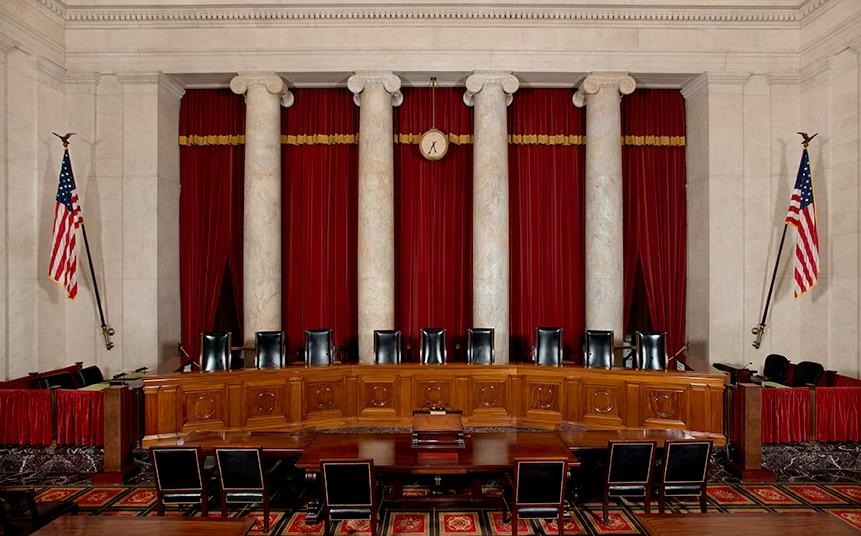
WASHINGTON – The U.S. Supreme Court issued a ruling Friday evening that will preserve the status quo for access to the abortion medication mifepristone pending the outcome of ongoing litigation that is now before the U.S. Court of Appeals for the 5th Circuit.
Conservative Justices Samuel Alito and Clarence Thomas opposed the decision in the 7-2 ruling, which was made pursuant to an emergency request by the U.S. Department of Justice to block rulings by lower federal courts that would have severely restricted access to the drug.
The legal battle continues to play out in the 5th Circuit, which is slated to hear oral arguments for the case, Alliance for Hippocratic Medicine v. U.S. Food and Drug Administration, on May 17.
The case was brought on appeal from the ruling by Judge Matthew Kacsmaryk of the U.S. District Court for the Northern District of Texas, that effectively revoked the Food and Drug Administration’s 2000 approval of the drug, which would thereby prohibit the its sale and distribution even in states where abortion remains legal.
“I continue to stand by FDA’s evidence-based approval of mifepristone,” President Joe Biden said in a statement issued Friday after the High Court’s ruling. “My Administration will continue to defend FDA’s independent, expert authority to review, approve, and regulate a wide range of prescription drugs,” the President said.
A statement issued by Vice President Kamala Harris stressed the importance of preserving access to mifepristone within the context of reproductive freedoms for women.
“The President and I will continue to fight to protect a woman’s freedom to make decisions about her own body and access to reproductive health care, including medication abortion,” Harris said. “No one should stand between a woman and her doctor.”
California Gov. Gavin Newsom’s (D) statement took aim at what he characterized as partisan motivated efforts by jurists and political actors to restrict access to abortion drugs whose safety and efficacy has been well documented over more than two decades.
“The U.S. Supreme Court is right to take this action to protect access to medication abortion and put a hold on the extreme decisions of the Texas judge and the Fifth Circuit Court of Appeals,” the Governor said.
U.S. Federal Courts
High Court again delays move on mifepristone access, until Friday
The two-day extension, SCOTUSblog wrote, is “unusual” – likely signaling that discussions among the justices are ongoing
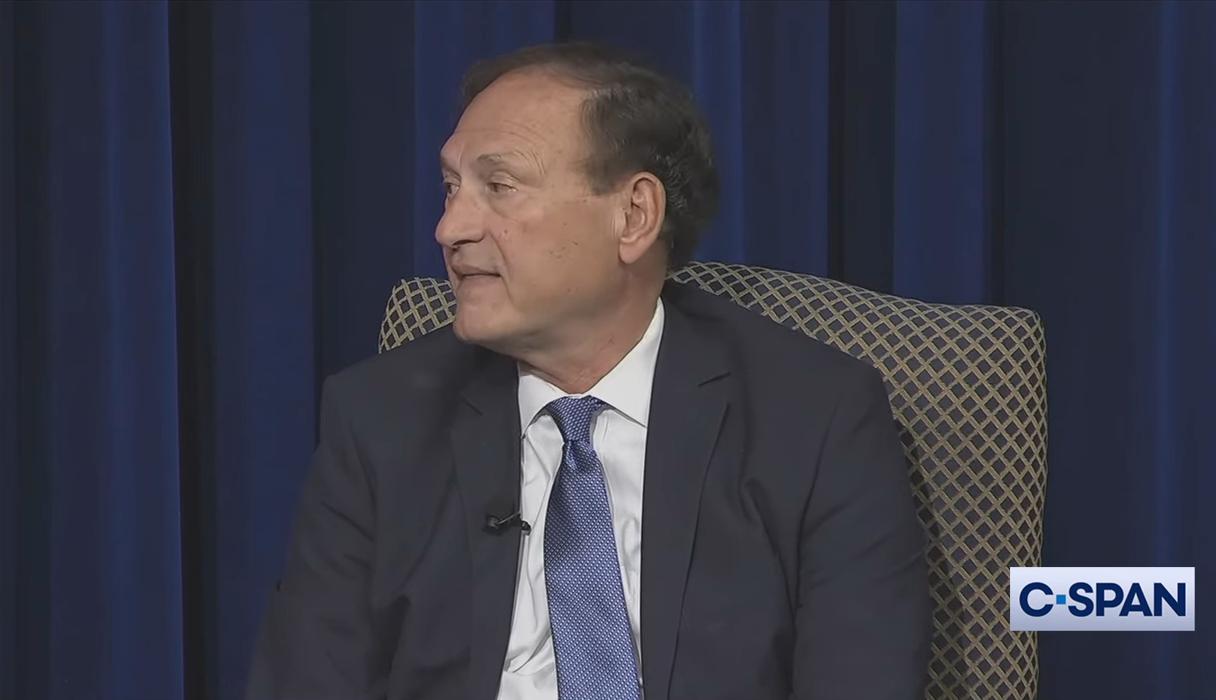
WASHINGTON – The U.S. Supreme Court on Wednesday announced an extension, through midnight on Friday, of its administrative stay of a ruling issued earlier this month by a trial judge that reverses the U.S. Food and Drug Administration’s 2000 approval of the abortion pill mifepristone.
According to SCOTUSblog, “the justices are extremely likely to issue a further ruling before the administrative stay expires,” which could mean the High Court allows those restrictions to go into effect, blocks them entirely, or finds “some middle ground.”
Alliance for Hippocratic Medicine v. U.S. Food and Drug Administration, decided on April 7 by Trump-appointed Judge Matthew Kacsmaryk of the U.S. District Court for the Northern District of Texas, is now on appeal before the U.S. Court of Appeals for the 5th Circuit.
Justice Samuel Alito, who oversees the 5th Circuit, issued the order extending the administrative stay on Kacsmaryk’s ruling until Friday, thereby preserving the status quo with respect to mifepristone access.
The two-day extension, SCOTUSblog wrote, is “unusual” – likely signaling that discussions among the justices are ongoing, possibly in preparation for a Supreme Court opinion or a “nuanced stay order.”
Kacsmaryk’s opinion, though it aligned with his judge’s well established views on abortion and was anticipated by the Biden-Harris administration as well as reproductive justice advocates, was nevertheless unusual.
The ruling provoked backlash over its circumvention of the FDA’s expertise regarding and Congressionally ordained authority over on the safety and efficacy of drugs.
U.S. Federal Courts
Supreme Court temporarily halts abortion pill restrictions
The move by conservative Justice Samuel Alito will give the High Court until April 19 to decide whether those restrictions will be kept

WASHINGTON – The U.S. Supreme Court on Friday temporarily suspended orders from the U.S. District Court for the Northern District of Texas and the U.S. Court of Appeals for the 5th Circuit that would have restricted the nationwide sale and distribution of the abortion medication mifepristone.
The move by conservative Justice Samuel Alito will give the High Court until Wednesday April 19 to decide whether those restrictions will be kept in place pending the outcome of litigation over the case, Alliance for Hippocratic Medicine v. U.S. Food and Drug Administration, which is now on appeal before the 5th Circuit.
Last week, Judge Matthew Kacsmaryk of the U.S. District Court for the Northern District of Texas issued a stay of the FDA’s approval of mifepristone 23 years ago, effectively barring its sale and distribution nationwide.
On appeal, the 5th Circuit ruled late Wednesday night that access to the drug would be restricted, though not banned entirely, pending the outcome of the case.
But for the Supreme Court’s decision on Friday, which effectively preserves the status quo until next Wednesday, access to mifepristone would have required multiple doctors visits while telehealth consultations and mail order prescriptions would have been excluded.
Medication abortions account for more than half of all abortions performed each year in the United States. Mifepristone was first approved by the FDA in 2000, and the drug has since been proven safe and effective over more than two decades.
The Biden-Harris administration joined many legal observers in objecting to Kacsmaryk’s ruling, which these stakeholders considered an unlawful circumvention of the FDA’s Congressionally ordained power to evaluate the safety and efficacy of medications.
Kacsmaryk does not have formal training in science or medicine. Shortly after his ruling, 200 pharmaceutical industry executives issued an open letter arguing the move had cast such uncertainty around the drug approvals process that pipelines for new drug discovery would be threatened.
U.S. Federal Courts
DoJ to ask High Court to halt rulings on abortion pill restrictions
DoJ will “defend the FDA’s scientific judgment and protect Americans’ access to safe and effective reproductive care”

WASHINGTON – The U.S. Department of Justice is expected to ask the U.S. Supreme Court to halt a pair of rulings by a federal court in Texas and a federal appellate court in New Orleans that would restrict the sale and distribution of the abortion pill mifepristone.
Last week, Judge Matthew Kacsmaryk of the U.S. District Court for the Northern District of Texas issued a stay of the U.S. Food and Drug Administration’s approval of the drug 23 years ago, effectively barring its sale and distribution nationwide.
The U.S. Court of Appeals for the 5th Circuit ruled late Wednesday night that access to the drug would not be prohibited pending the outcome of litigation in the case, Alliance for Hippocratic Medicine v. FDA.
However, in the meantime the appellate court preserved other restrictions on mifepristone from Kacsmaryk’s ruling including: the prohibition of distributing the medicine by mail or prescribing its FDA approved generic equivalent; and requiring that it be prescribed only after three in-person visits with a healthcare provider, and only up to seven weeks of pregnancy.
“The Justice Department strongly disagrees with the Fifth Circuit’s decision in Alliance for Hippocratic Medicine v. FDA to deny in part our request for a stay pending appeal,” U.S. Attorney General Merrick Garland said in a statement on Thursday.
“We will be seeking emergency relief from the Supreme Court to defend the FDA’s scientific judgment and protect Americans’ access to safe and effective reproductive care,” Garland said.
“We are going to continue to fight in the courts, we believe the law is on our side, and we will prevail,” White House Press Secretary Karine Jean-Pierre told reporters early Thursday during President Biden’s Irish trip.
The U.S. Supreme Court typically acts on such requests in a matter of days, often without explanation.
U.S. Federal Courts
Judge’s nationwide abortion pill ban ‘could open the floodgates’
“You’re not talking about just mifepristone,” U.S. Department of Health & Human Services Secretary Xavier Becerra said on CNN

WASHINGTON – White House Press Secretary Karine Jean-Pierre told reporters Monday that Friday’s decision by a Federal court in Texas to ban the nationwide sale and distribution of the abortion pill mifepristone “could open the floodgates for other medications to be targeted and denied to people who need them.”
Following that ruling by Judge Matthew Kacsmaryk of the U.S. District Court for the Northern District of Texas, American Medical Association President Jack Resneck raised similar concerns in a statement warning that “upending longstanding drug regulatory decisions by the U.S. Food and Drug Administration (FDA)” would position “other drugs at risk of being subject to similar efforts.”
“This ruling makes every medication on the market a potential target for political grandstanding,” Whitman-Walker Institute Executive Director Kellan Baker told the Washington Blade by email.
“Now that Judge Kacsmaryk has decided that he knows more about medical evidence than the FDA, the entire foundation of the FDA’s essential role in safeguarding access to medications is now subject to political attack,” Baker said.
“You’re not talking about just mifepristone,” U.S. Department of Health and Human Services Secretary Xavier Becerra said during an appearance on CNN’s “State of the Union” Sunday. “You’re talking about every kind of drug. You’re talking about our vaccines. You’re talking about insulin. You’re talking about the new Alzheimer’s drugs that may come on.”
Likewise, in an interview on Pod Save America that aired Tuesday, University of Michigan and former U.S. Supreme Court law clerk, law professor Leah Litman agreed drugs like HIV medications, along with vaccines like those targeting HPV and Covid, or even birth control pills, could be next.
Medicines for trans youth and adults, in some cases, have been targeted with legislation passed by conservative states to restrict access to guideline directed medically necessary interventions for the treatment of gender dysphoria.
And last year, in another Federal Texas court, that judge ruled that employers can deny health coverage for PrEP, a medication used to prevent the transmission of HIV.
More litigation lies ahead, along with more uncertainty
In his ruling in Alliance for Hippocratic Medicine v. FDA, Kacsmaryk had issued a stay on the Food and Drug Administration’s conclusion that mifepristone is safe and effective, a finding the agency reached in 2000 that has since been buttressed by more than two decades of clinical evidence.
It was roundly denounced as unscientific, the product of the judge’s longstanding and well documented ideological opposition to abortion.
The Biden administration was prepared for Kacsmaryk’s decision, Jean-Pierre said: U.S. Attorney General Merrick Garland immediately ordered the Justice Department to appeal and seek a stay (of Kacsmaryk’s stay) pending the outcome of additional litigation. On Monday the Department asked the U.S. Court of Appeals for the Fifth Circuit to halt implementation of the ruling.
Other powerful legal actors had also been on notice. On Monday, New York Attorney General Letitia James led a coalition of state attorneys general in challenging Kacsmaryk’s ruling with an amici brief filed with the 5th Circuit.
Casting additional uncertainty into the mix was a separate ruling, just hours after Kacsmaryk’s on Friday of last week, by Judge Thomas Rice of the U.S. District Court for the Eastern District of Washington, who ordered the FDA to make no changes to the availability of mifepristone.
The case in Washington was brought by attorneys general from 17 states and the District of Columbia in anticipation of Kacsmaryk’s ruling, and the split decision means the matter is likely to be settled by the U.S. Supreme Court.
Some legal observers speculated that the Biden administration may be pushing for this outcome, hedging that even with its 6-3 conservative supermajority the Justices are likely to reject Kacsmaryk’s analysis of the relevant facts on substantive or procedural grounds.
Still, and notwithstanding the fate of other medications or vaccines in the hands of Kacsmaryk or his ideological allies on the federal bench, the court’s ruling raises other major concerns.
For example, can a federal judge circumvent the Congressionally ordained power of America’s federal administrative agencies? If so, under which circumstances? How about the practice of forum shopping, by which litigants deliberately move to have their cases adjudicated by judges they expect will be most sympathetic? And what will all of this uncertainty mean for the global biopharmaceutical industry and the future of drug discovery in America?
One solution that was proposed by at least two Democratic members of Congress, Rep Alexandria Ocasio-Cortez (N.Y.) and Sen. Ron Wyden (Ore.): the Biden administration should simply ignore Kacsmaryk’s ruling.
“I believe the Food and Drug Administration has the authority to ignore this ruling, which is why I’m again calling on President Biden and the FDA to do just that,” Wyden said in a statement Friday.
“If they don’t,” warned the Senator, “the consequences of banning the most common method of abortion in every single state will be devastating.”
“The courts rely on the legitimacy of their rulings, and what they are currently doing is engaging in an unprecedented erosion of their legitimacy,” Ocasio-Cortez told Anderson Cooper during an interview on CNN Friday.
On Twitter, the Congresswoman addressed the backlash against her comments, explaining that Republicans have also ignored court orders in cases where they felt they were unlawful.
GOP are losing their mind over this, but there’s precedent – including their own.
— Alexandria Ocasio-Cortez (@AOC) April 9, 2023
Courts ordered Trump to fully restore DACA. They ignored it w/ Republican support.
GOP operate in complete contempt for the law until they’re in a position to shred Constitutional & human rights. https://t.co/kfxsdF5eKG
On Monday, the White House circulated an open industry letter signed by more than 200 pharmaceutical industry executives, which echoed criticisms of Kacsmaryk’s ruling that noted his lack of formal education or training in science or medicine.
The executives’ letter also argued the decision presents systemic risks to the drug discovery pipeline.
“As an industry we count on the FDA’s autonomy and authority to bring new medicines to patients under a reliable regulatory process for drug evaluation and approval,” the group wrote.
“Adding regulatory uncertainty to the already inherently risky work of discovering and developing new medicines will likely have the effect of reducing incentives for investment, endangering the innovation that characterizes our industry.”
-

 Breaking News3 days ago
Breaking News3 days agoMajor victory for LGBTQ funding in LA County
-

 Features3 days ago
Features3 days agoKoaty & Sumner: Finding love in the adult industry
-

 Commentary21 hours ago
Commentary21 hours agoBreaking the mental health mold with Ketamine: insights from creator of Better U
-

 Books5 days ago
Books5 days agoTwo new books on dining out LGBTQ-style
-

 Miscellaneous2 days ago
Miscellaneous2 days agoCan you really find true love in LA? Insights from a queer matchmaker
-

 El Salvador3 days ago
El Salvador3 days agoLa marcha LGBTQ+ desafía el silencio en El Salvador
-

 Arts & Entertainment2 days ago
Arts & Entertainment2 days agoIntuitive Shana gives us her hot take for July’s tarot reading
